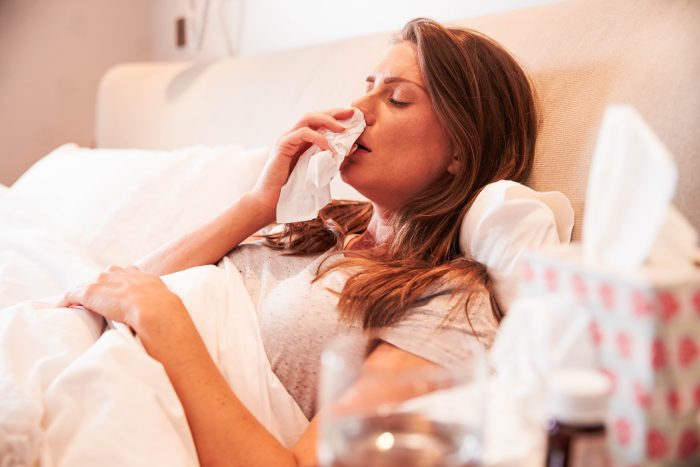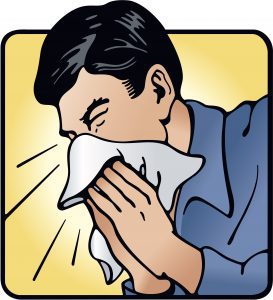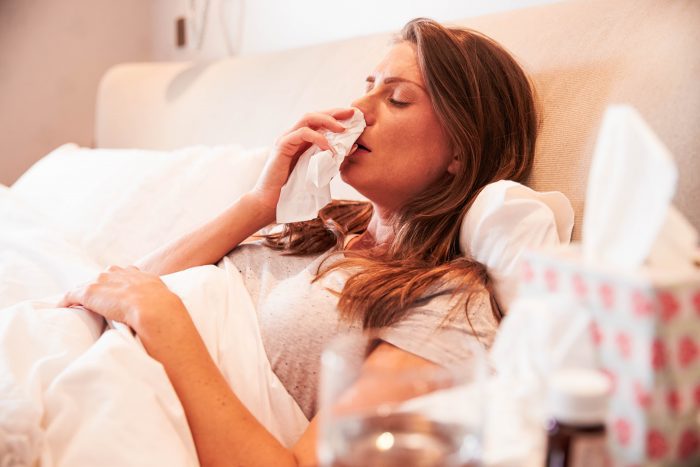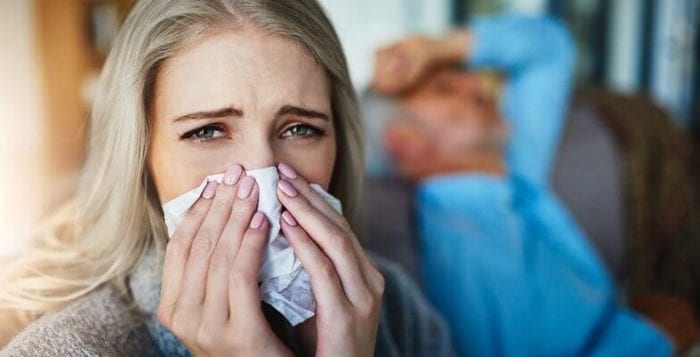Home remedies may be more helpful than supplements
By David Dunaief, M.D.

These past few weeks, I’ve been hearing a lot more sniffling, sneezing and coughing. Cold season is here. A cold’s effects can range from mild annoyance to more serious symptoms that put us out of commission for weeks.
First, you might be able to prevent catching a cold with some common-sense tactics: wash your hands frequently and avoid touching your face to help minimize your exposure. Frankly, this is good practice to avoid many of the viruses circulating at this time of year.
If you do catch a common cold, you might be able to reduce your symptoms or the cold’s duration with some simple homestyle remedies and a few dietary supplements.
How do you relieve cold symptoms?
Congestion or coughing symptoms can be eased by sitting in a steamy bathroom. This simulates a medical mist tent, moisturizing your nasal and bronchial passages.
You might also try nasal irrigation, which uses a saline rinse or spray to flush your sinuses. This can help clear immediate congestion and thin secretions (1). There are pre-filled versions on the market, which make them easier to use. If you mix your own, the Cleveland Clinic’s website has detailed instructions and guidance (2). A few key points: do not share equipment, clean your equipment properly, and do not use tap water without boiling it.
Dry heat is your enemy when you’re experiencing cold symptoms. If your home or office is dry, use a cool mist humidifier to put some humidity back in the air. Take care to clean your humidifier to avoid mildew and mold buildup.
You can eat salt-free soups loaded with vegetables to increase your nutrient intake and loosen congestion. I start with a sodium-free soup base and add spices, onions, spinach, broccoli, and other greens until it’s stew-like. High levels of sodium can dehydrate you and make you feel worse. Caffeine-free hot teas will also help loosen congestion and keep you hydrated.
Does Zinc reduce a cold’s duration?
According to a meta-analysis that included 13 trials, zinc in any form taken within 24 hours of your first symptoms may reduce the duration of a cold by at least one day (3). Even more importantly, zinc may significantly reduce the severity of your symptoms throughout, improving your quality of life. This may be due to an anti-inflammatory effect.
One of the studies found that zinc reduced the duration of the common cold by almost 50 percent from seven days to four days, cough symptoms were reduced by greater than 60 percent, and nasal discharge was reduced by 33 percent (4). Researchers used 13 grams of zinc acetate per lozenge taken three-to-four times daily for four days. This translates into 50-65 mg per day.
There are a few serious concerns with zinc. First, the dose researchers used was well above the maximum recommended intake is 40 mg per day for adults (5). Also, the FDA has warned against nasal zinc administration with sprays, which can result in permanent loss of smell.
Studies that showed a benefit have used different formulations, delivery systems and dosages, and there is no current recommendation or consensus on what is optimal.
Does vitamin C or echinacea help?
According to a review of 29 trials, vitamin C did not show any significant benefit in preventing or reducing cold symptoms or duration for the general population (6). However, a sub-group of serious marathon runners and other athletes who took vitamin C prophylactically caught 50 percent fewer colds.
The jury is still out on the effectiveness of echinacea for treatment of duration and symptoms, but the results are inconsistent and disappointing (7). In a randomized controlled trial with 719 patients, echinacea was no better than placebo for the treatment of common cold symptoms (8). There are ongoing studies to determine whether prophylactic use helps prevent colds (9).
Should you exercise or not?
A study published in the British Journal of Sports Medicine may challenge your perceptions about exercising when you have a cold. Participants who did aerobic exercise at least five days per week, versus one or fewer days per week, had a 43 percent reduction in the number of days with colds over two 12-week periods during the fall and winter months (10). Even more interesting is that those who reported themselves as being highly fit had 46 percent fewer days with colds compared to those who perceived themselves as having low fitness. Their cold symptoms were reduced significantly as well.
References:
(1) Am Fam Physician. 2009 Nov 15;80(10):1117-9. (2) clevelandclinic.org (3) Open Respir Med J. 2011; 5: 51–58. (4) J Infect Dis. 2008 Mar 15;197(6):795-802. (5) ods.od.nih.gov. (6) Cochrane Database of Syst Reviews 2013, Issue 1. Art. No.: CD000980. (7) Cochrane Database of Syst Reviews 2014, Issue 2. Art. No.: CD000530. (8) Ann Intern Med. 2010;153(12):769-777. (9) nccih.nih.gov. (10) British J Sports Med 2011;45:987-992.
Dr. David Dunaief is a speaker, author and local lifestyle medicine physician focusing on the integration of medicine, nutrition, fitness and stress management. For further information, visit www.medicalcompassmd.com or consult your personal physician.





 One of the studies, published in the Journal of Infectious Disease, found that zinc reduced the duration of the common cold by almost 50 percent from seven days to four days, cough symptoms were reduced by greater than 60 percent, and nasal discharge was reduced by 33 percent (2). Researchers used 13 grams of zinc acetate per lozenge taken three-to-four times daily for four days. This translates into 50-65 mg per day.
One of the studies, published in the Journal of Infectious Disease, found that zinc reduced the duration of the common cold by almost 50 percent from seven days to four days, cough symptoms were reduced by greater than 60 percent, and nasal discharge was reduced by 33 percent (2). Researchers used 13 grams of zinc acetate per lozenge taken three-to-four times daily for four days. This translates into 50-65 mg per day.






